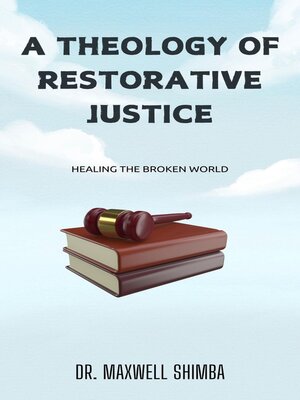
Sign up to save your library
With an OverDrive account, you can save your favorite libraries for at-a-glance information about availability. Find out more about OverDrive accounts.
Find this title in Libby, the library reading app by OverDrive.



Search for a digital library with this title
Title found at these libraries:
| Library Name | Distance |
|---|---|
| Loading... |
A Theology of Restorative Justice
Theology of Restorative Justice by Dr. Maxwell Shimba offers a profound exploration of justice from a spiritual and moral perspective, blending theological principles with restorative justice practices. Dr. Shimba argues that true justice is not solely punitive but restorative, aligning with many religious teachings that emphasize redemption, reconciliation, and healing. The book focuses on how justice, through a theological lens, is about repairing relationships-between individuals, communities, and even with God-rather than merely punishing wrongdoers.
Dr. Shimba draws heavily from biblical concepts, such as forgiveness, accountability, and the pursuit of peace, to demonstrate that restorative justice mirrors divine justice. He explores how God's justice seeks to restore rather than destroy, offering pathways for healing and redemption for both victims and offenders. His theology is grounded in the belief that every individual, regardless of their mistakes, has the potential for transformation and reconciliation, reflecting the biblical principle of mercy and grace.
Through a combination of theological insights and real-world examples, the Theology of Restorative Justice illustrates how faith communities can play a vital role in promoting restorative practices. Dr. Shimba emphasizes that restorative justice is not merely a social or legal process but a spiritual one, calling for empathy, understanding, and the restoration of broken relationships. His work invites religious leaders, communities, and individuals to embrace a more compassionate approach to justice, one that seeks healing and unity over retribution.







